Server
Set Required Env Variables
Preparing Env Variables
Configure require env variables via a .json
$ cat > server_sqlite.json <<EOF
{
"DB_TYPE": "sqlite",
"DB_NAME": "auth",
"ISSUER": "EasyAuth",
"SUBJECT": "EasyAuthAuth",
"AUDIENCE": "EasyAuthApis",
"KEY_PATH": "/my_key-location",
"KEY_NAME": "test_key"
}
EOF
Manually set env variables
$ export VAR=VALUE
Create Server
#test_server.py
from fastapi import FastAPI
from easyauth.server import EasyAuthServer
server = FastAPI()
server.auth = await EasyAuthServer.create(
server,
'/auth/token',
auth_secret='abcd1234',
admin_title='EasyAuth - Company',
admin_prefix='/admin',
env_from_file='server_sqlite.json'
)
Start Server
$ uvicorn --host 0.0.0.0 --port 8330 test_server:server
First Startup
When a server is started for the first time, detected by table creation (database tables not existing yet), a new admin user / group / role / action is created automatically, search in logs for # the password:
01-25 10:32 EasyAuthServer ERROR detected new EasyAuth server, created admin user with password: ymbuvwop
Keys
When an EasyAuthServer starts, it checks the provided KEY_NAME & KEY_PATH location for existing keys, if none exist they are created.
$ ls test_key*
test_key.key test_key.pub
Important .key file must be kept safe!
Do not store in the paths monitored by git to avoid accidental commit.
The .pub file may be copied to separate apps which you want to may want to verify the validity of tokens on.
EasyAuthClients will automatically pull the public key from the EasyAuthSever at startup.
If either key is, ever lost, they will be re-created on the EasyAuthServer in the KEY_PATH location upon restart.
APIRouter
FastAPI provides an APIRouter object for defining path prefixes, pre-defined dependencies, see fastapi docs for more details. EasyAuthServer can extend the main FastAPI router using the .create_api_router() method.
EasyAuthAPIRouter Considerations
EasyAuthAPIRouter should be created after an EasyAuthClient or EasyAuthServer is created to ensure that the router are correctly included and visible in OpenAPI schema.
from fastapi import FastAPI
from easyauth.server import EasyAuthServer
server = FastAPI()
server.auth = EasyAuthServer.create(
server,
'/auth/token',
auth_secret='abcd1234',
admin_title='EasyAuth - Company',
admin_prefix='/admin',
env_from_file='server_sqlite.json'
)
# import sub modules
from .finance import finance
from .hr import hr
from .marketing import marketing
from easyauth.router import EasyAuthAPIRouter
from easyauth import get_user
finance_router = EasyAuthAPIRouter.create(prefix='/finance', tags=['finance'])
@router.get('/')
async def finance_root():
return f"fiance_root"
@router.get('/data')
async def finance_data(user: get_user()):
return f"{user} can access finance_data"
Tip
server.auth.create_api_router() is a wrapper around FastAPI's APIRouter, accepting and passing the same arguments, but also automatically including the router at startup.
.
├── app
│ ├── __init__.py
│ ├── server.py
│ └── marketing
│ │ ├── __init__.py
│ │ ├── marketing.py
│ └── finance
│ │ ├── __init__.py
│ │ ├── finance.py
│ └── hr
│ ├── __init__.py
│ └── hr.py
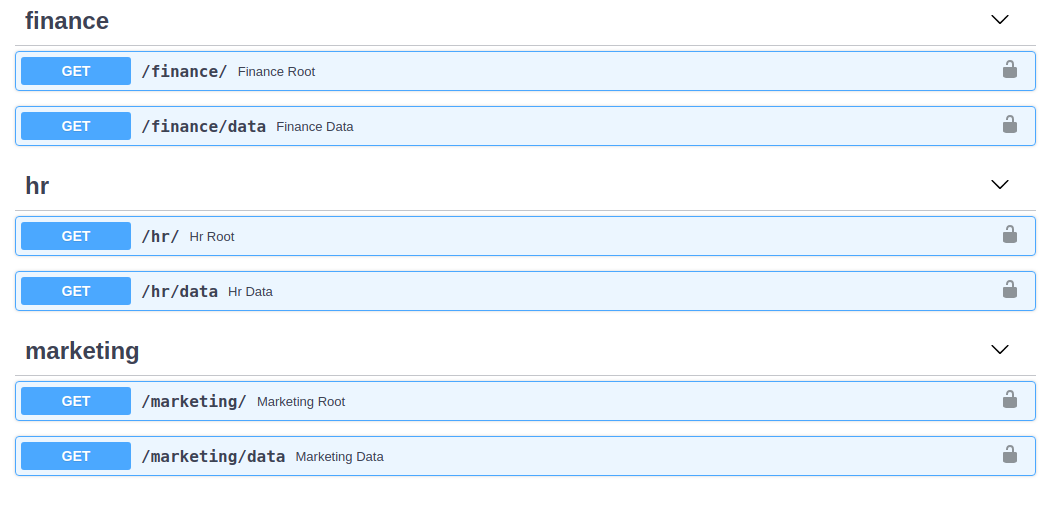
API
This new admin user is required to access the APIs pre-created at the listening server location:
01-25 10:32 uvicorn.error INFO Application startup complete.
INFO: Uvicorn running on http://0.0.0.0:8330 (Press CTRL+C to quit)
Info
Navigate to 0.0.0.0:8330/docs

GUI
The EasyAuth Admin GUI is accessible by accessing the listening host:port at the defined admin_prefix location.
GUI URL
http://0.0.0.0/{admin_prefix}
http://0.0.0.0/admin
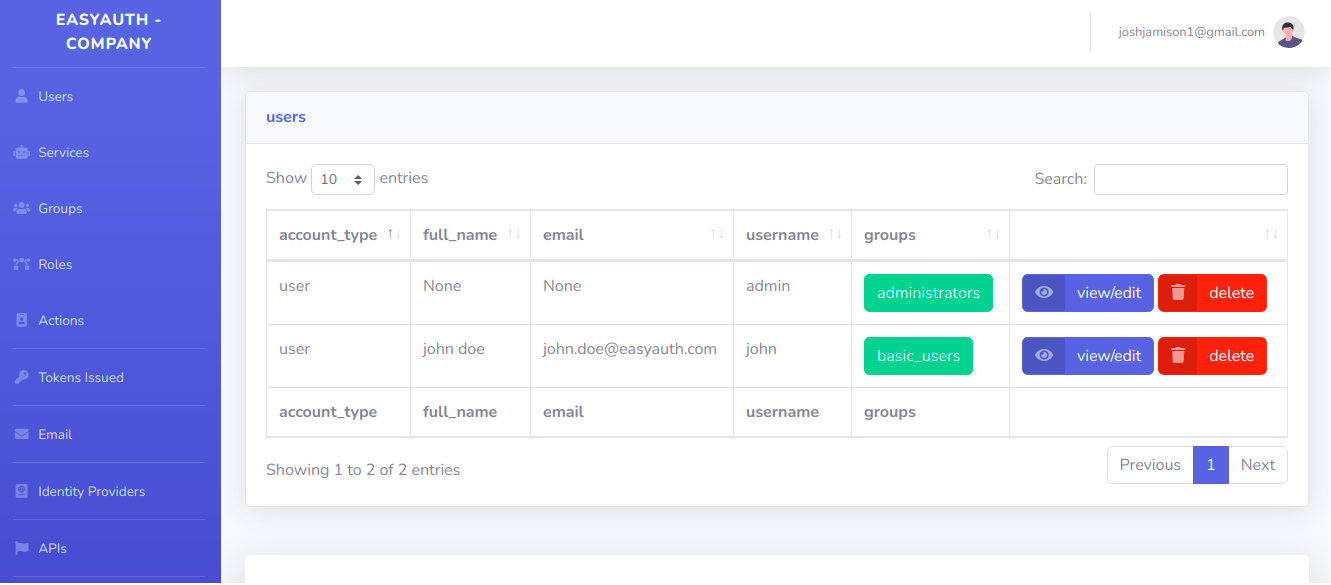
Docker
The latest container TAGs are available on DockerHub, the latest tag will match the latest PYPI version.
Start Auth Server
mkdir -p $(pwd)/easyauth-vol
docker run --name easyauth \
-e DB_TYPE=sqlite \
-e DB_NAME=auth \
-e DB_LOCAL_PATH=/mnt/easyauth \
-e ISSUER=EasyAuth \
-e SUBJECT=EasyAuthAuth \
-e AUDIENCE=EasyAuthApis \
-e KEY_PATH=/mnt/easyauth \
-e KEY_NAME=test_key \
-e AUTH_SECRET=my-secret \
-e ADMIN_PREFIX="/admin" \
-e ADMIN_TITLE="EasyAuth - Example" \
-e AUTH_WORKERS=1 \
-v $(pwd)/easyauth-vol:/mnt/easyauth \
-p 8220:8220 \
-d joshjamison/easyauth:v0.0.1
Pull Adminstrator Password from logs
$ docker logs easyauth[2021-04-23 15:36:07 +0000] [6] [INFO] Starting gunicorn 20.1.0[2021-04-23 15:36:07 +0000] [6] [INFO] Listening at: http://0.0.0.0:8220 (6)
[2021-04-23 15:36:07 +0000] [6] [INFO] Using worker: uvicorn.workers.UvicornWorker
[2021-04-23 15:36:07 +0000] [8] [INFO] Booting worker with pid: 8
[2021-04-23 15:36:07 +0000] [8] [INFO] Started server process [8]
[2021-04-23 15:36:07 +0000] [8] [INFO] Waiting for application startup.
04-23 15:36 EasyAuthServer ERROR detected new EasyAuth server, created admin user with password: cwmykhzj
[2021-04-23 15:36:09 +0000] [8] [INFO] Application startup complete.
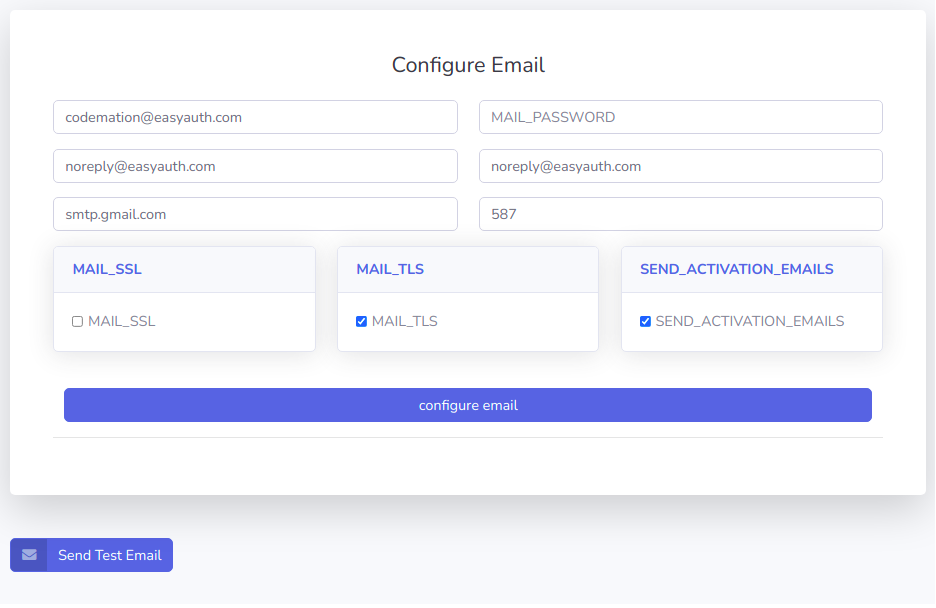 An EasyAuthServer may be configured to use an SMTP server. The EasyAuthServer and connected EasyAuthClients can utilize the email server for the following:
An EasyAuthServer may be configured to use an SMTP server. The EasyAuthServer and connected EasyAuthClients can utilize the email server for the following:
- sending activation codes for new user registrations
- sending password reset emails
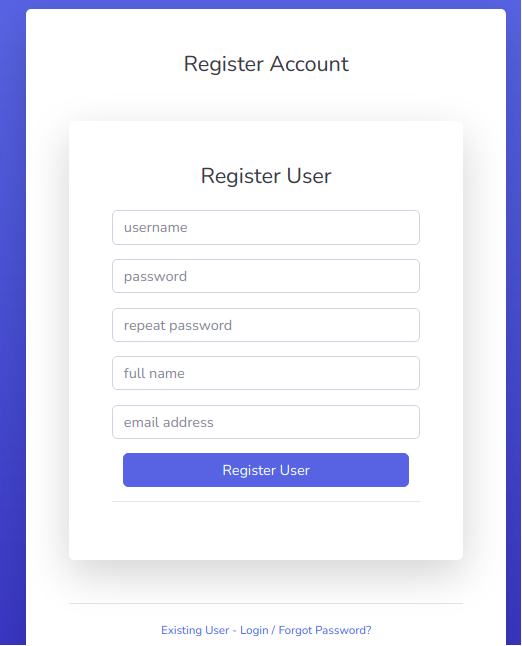
Tip
Default endpoints for register exist at /register
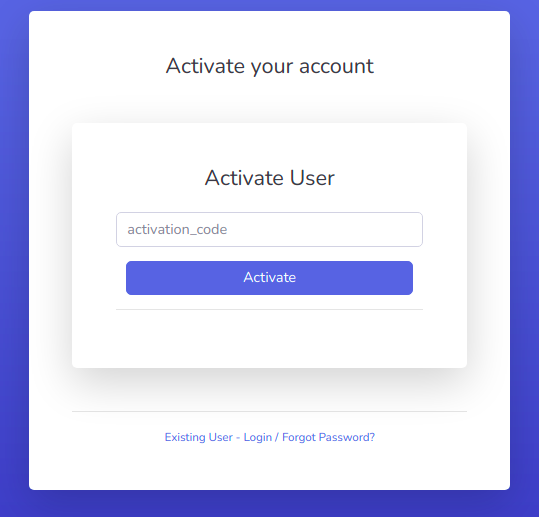
Tip
Default endpoints for activate exist at /activate
Identity Providers
Identity providers configuration is provided to allow third party authentications services to integrate within EasyAuth permissions.
API
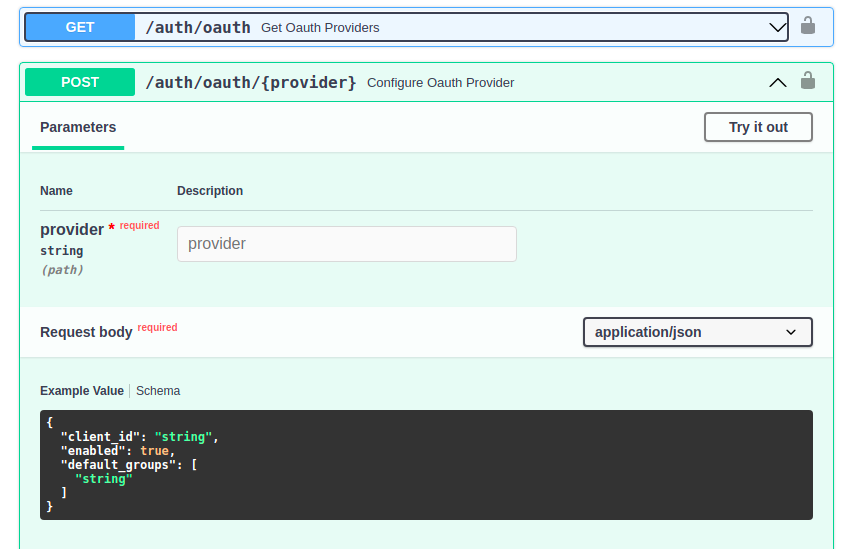
Default Permissions
default_groups provides a means to automatically assign new users to a group wether via /register or google login.
EasyAuth
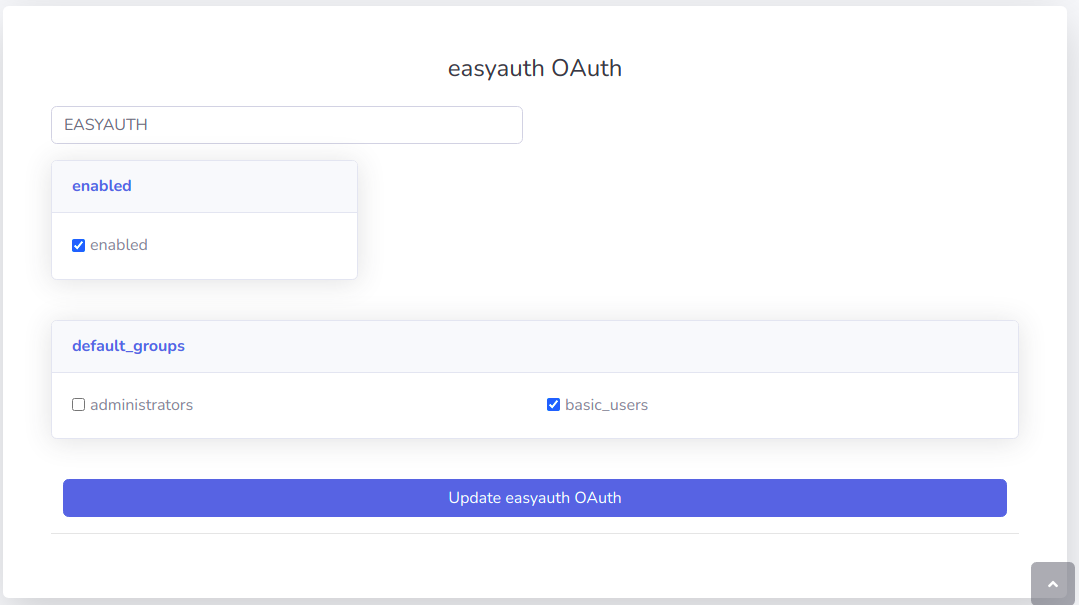
EasyAuth can be enabled to support registering / login from authenticated Google users
Pre-Requisites
- google client ID
- configured Authorized Javascript Origins & redirect URI's
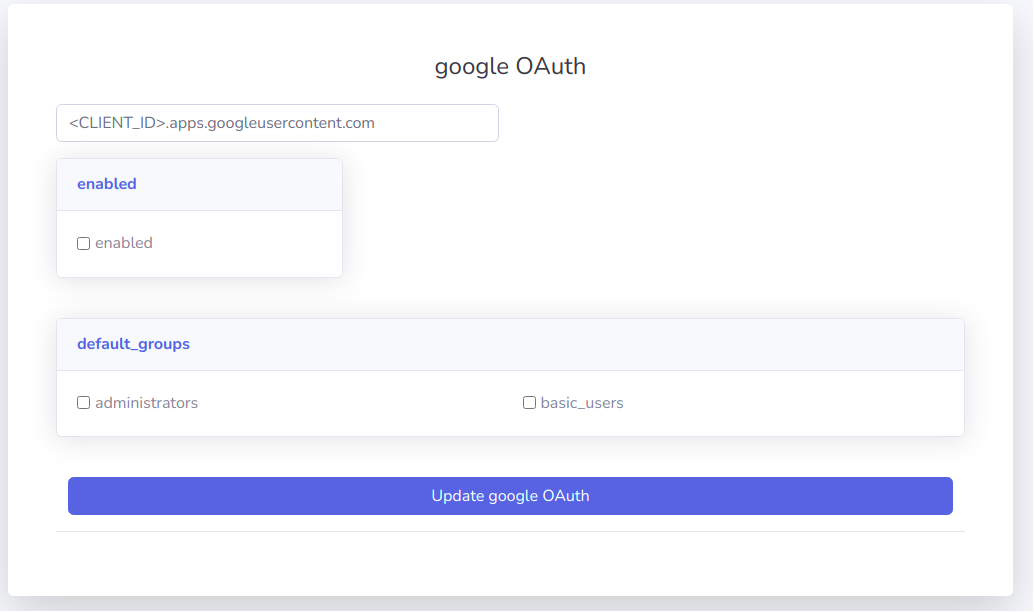
Warning
If no default_groups are configured for the Google Identity Provider, new users will default to EasyAuth provider's default_groups.
Setup Google Client ID
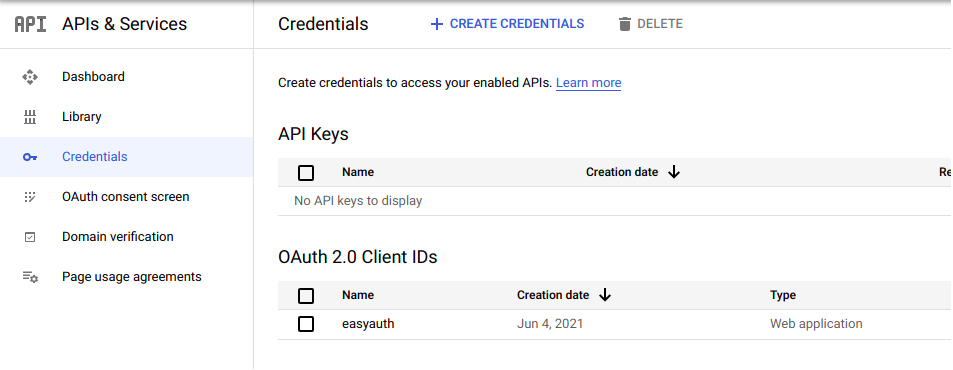
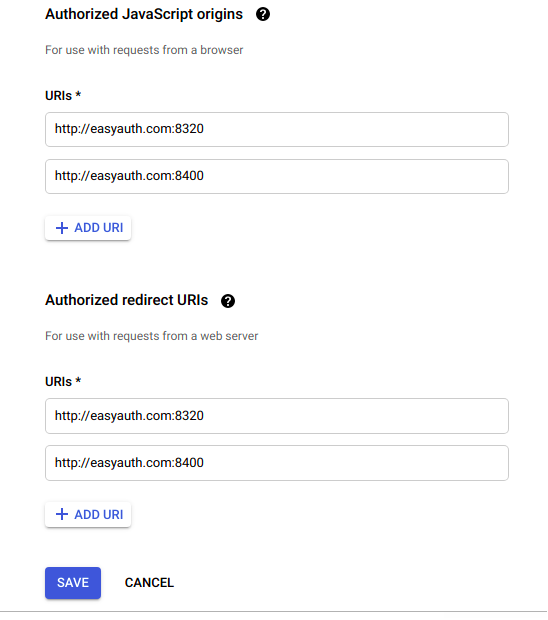
Note on EasyAuthClients
EasyAuthClient inherit the ability use a EasyAuthServers Google configuration, but still require associating the clients URIs http://client-name:port/ from the google console.
Tip
In testing Google authentication locally, redirect your local DNS in /etc/hosts
$ cat /etc/hosts
127.0.0.1 localhost easyauth.com easyauth-client.com
Troubleshooting
Use browser developer tools to view browser console logs Ctrl + shift + i
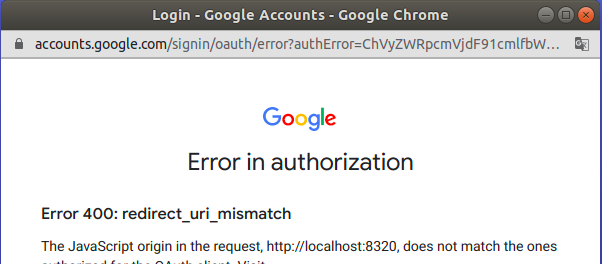
Updating Browser Path to overriden host path, login should then be possible if correctly configured in google console
Page Overloads
It is possible to overload the existing login, register, activation, not_found, and forbidden pages using the page specific "overloader". Just like routers, this should be done after an EasyAuthClient is created.
Danger
Consider reviewing what API's are used / required before overloading any existing page. Oauth Login scripts are not loaded into overloaded pages.
Not Found - 404
from easyauth.pages import NotFoundPage
@NotFoundPage.mark()
def custom_not_found_page():
return "Custom 404 Page"
Tip
NotFoundPage contents is wrapped in an HTMLResponse with a status_code 404.
Forbidden Page - 403
from easyauth.pages import ForbiddenPage
@ForbiddenPage.mark()
def not_allowed_page():
return "Custom 404 Page"
Login Page & 401
from easyauth.pages import LoginPage
@LoginPage.mark()
def custom_login_page():
return "Custom Login Page"
Register Page
from easyauth.pages import RegisterPage
@RegisterPage.mark()
def custom_register_page():
return "Custom Register Page"
Activation Page
from easyauth.pages import ActivationPage
@ActivationPage.mark()
def custom_activation_page():
return "Custom Login Page"